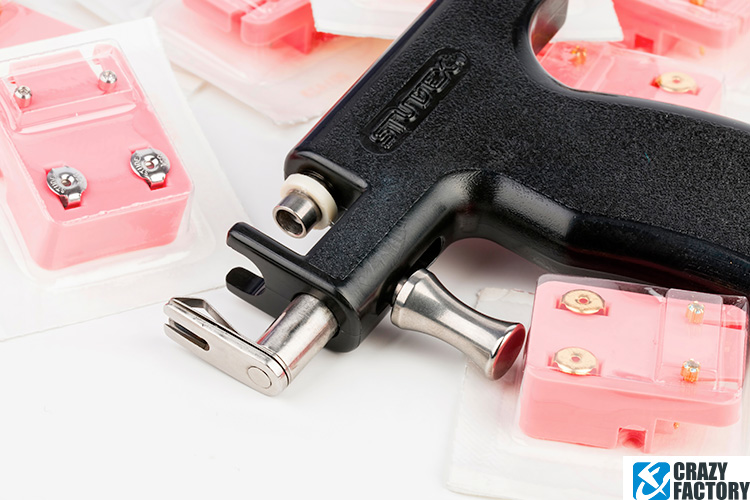Ohrlochpistole/en: Unterschied zwischen den Versionen
Zur Navigation springen
Zur Suche springen
(Die Seite wurde neu angelegt: „frame|alt=Ohrlochpistole“) |
(Die Seite wurde neu angelegt: „<i>Piercing tool</i><br> <br>Piercing guns were originally developed to mark cattle, but since the 1960s a slightly adapted version has been used for human earlobe piercings. <br><br> However, we don’t recommend these, for two reasons. Firstly, they can’t be sterilized because some parts are made of plastic, which melts in an autoclave. Secondly, it’s harder to position and angle the hole correctly than with a piercing needle. <br><br> Punching is…“) |
||
| Zeile 4: | Zeile 4: | ||
<h4>Ear-piercing gun</h4> | <h4>Ear-piercing gun</h4> | ||
<i>Piercing tool</i><br> | |||
<i> | <br>Piercing guns were originally developed to mark cattle, but since the 1960s a slightly adapted version has been used for human earlobe piercings. | ||
<br> | <br><br> | ||
<br> | However, we don’t recommend these, for two reasons. Firstly, they can’t be sterilized because some parts are made of plastic, which melts in an autoclave. Secondly, it’s harder to position and angle the hole correctly than with a piercing needle. | ||
<br><br> | |||
Punching is also very hard on the tissue, making infections more likely. While some opticians and other service providers use a gun to pierce ears, we strongly advise against them. If you want yours pierced, go straight to a professional piercer who uses hygienic disposable needles and can position the piercing safely and accurately. | |||
Aktuelle Version vom 24. September 2021, 13:13 Uhr
Ear-piercing gun
Piercing tool
Piercing guns were originally developed to mark cattle, but since the 1960s a slightly adapted version has been used for human earlobe piercings.
However, we don’t recommend these, for two reasons. Firstly, they can’t be sterilized because some parts are made of plastic, which melts in an autoclave. Secondly, it’s harder to position and angle the hole correctly than with a piercing needle.
Punching is also very hard on the tissue, making infections more likely. While some opticians and other service providers use a gun to pierce ears, we strongly advise against them. If you want yours pierced, go straight to a professional piercer who uses hygienic disposable needles and can position the piercing safely and accurately.
